Coumatetralyl
- CAS NO.:5836-29-3
- Empirical Formula: C19H16O3
- Molecular Weight: 292.33
- MDL number: MFCD00078644
- EINECS: 227-424-0
- SAFETY DATA SHEET (SDS)
- Update Date: 2024-12-18 14:08:57
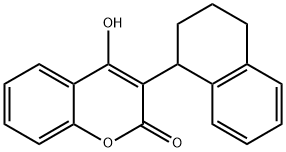
What is Coumatetralyl?
Description
Coumatetralyl, is also called 4-hydroxy-3-(1,2,3,4-
tetrahydro-1-naphthyl)coumarin, consists of colorless crystals which are
slightly soluble in water (pH 7), benzene, toluene, diethyl
ether, readily soluble in dimethylformamide, dichloromethane,
isopropanol, soluble in alcohols, acetone.
Coumatetralyl is produced by the condensation of 4-
hydroxycoumarin with 1,2,3,4-tetrahydro-1-naphthol (28).
First introduced in 1956, coumatetralyl is one of the
most widely used first-generation anticoagulants. It is not,
however, available in the United States.
Chemical properties
Coumatetralyl is a yellowish-white, crystalline solid.
The Uses of Coumatetralyl
Coumatetralyl is used as an anticoagulant rodenticide. Coumatetralyl is widely used to control rodent populations.
Definition
ChEBI: Coumatetralyl is a hydroxycoumarin.
General Description
Yellowish-white crystalline powder; colorless when pure; odorless. Coumatetralyl is used as a rodenticide, functioning as an anticoagulant that does not induce bait-shyness.
Reactivity Profile
Ketones, such as Coumatetralyl, are reactive with many acids and bases liberating heat and flammable gases (e.g., H2). The amount of heat may be sufficient to start a fire in the unreacted portion of the ketone. Ketones react with reducing agents such as hydrides, alkali metals, and nitrides to produce flammable gas (H2) and heat. Ketones are incompatible with isocyanates, aldehydes, cyanides, peroxides, and anhydrides. They react violently with aldehydes, HNO3, HNO3 + H2O2, and HClO4.
Health Hazard
Overdosage with anticoagulants may cause acute bleeding. Pre-existing blood clotting disease or liver disease may be aggravated by exposure.
Fire Hazard
(Non-Specific -- Coumarin Derivative Pesticide, Solid, n.o.s.) Coumatetralyl may burn but does not ignite readily. Fire and runoff from fire control water may produce irritating or poisonous gases. Runoff from fire control water may give off poisonous gases. Container may explode in heat of fire. Enolic form of compound has acidic properties and can form salts with metals.
Agricultural Uses
Rodenticide: Coumatetralyl is used for rat control and functions as an anticoagulant, of the warfarin type, that does not induce bait-shyness. Not approved for use in EU countries or the U.S. There are 17 global suppliers.
Trade name
BAY® 25634; BAY ENE® 11183B; BAYER® 25,634; ENDOX®; ENDROCID®; ENDROCIDE®; RACUMIN®; RAUCUMIN® 57; RODENTIN®
Potential Exposure
Coumatetralyl is used as a rodenticide, functioning as an anticoagulant that does not induce baitshyness.
First aid
If this chemical gets into the eyes, remove anycontact lenses at once and irrigate immediately for at least15 min, occasionally lifting upper and lower lids. Seek medical attention immediately. If this chemical contacts theskin, remove contaminated clothing and wash immediatelywith soap and water. Speed in removing material from skinis of extreme importance. Shampoo hair promptly if contaminated. Seek medical attention immediately. If this chemicalhas been inhaled, remove from exposure, begin rescuebreathing (using universal precautions, including resuscitation mask) if breathing has stopped and CPR if heart actionhas stopped. Transfer promptly to a medical facility. Whenthis chemical has been swallowed, get medical attention.Give large quantities of water and induce vomiting. Do notmake an unconscious person vomit. Medical observation isrecommended for 24-36 h following overexposure, aseffects may be delayed.
storage
Color Code—Blue: Health Hazard/Poison: Storein a secure poison location. Prior to working with thischemical you should be trained on its proper handling andstorage. Store in tightly closed containers in a cool, wellventilated area away from oxidizers
Shipping
UN3027 Coumarin derivative pesticides, solid, toxic, Hazard Class: 6.1; Labels: 6.1-Poisonous materials.
Toxicity evaluation
The acute toxicity for Norway rats is given as high but, as with many of these compounds, coumatetralyl is more potent when administered in consecutive daily doses. No satisfactory data are available on the acute oral toxicity of the compound to mice. However, a complete kill of mice was obtained in the laboratory following 21 days of feeding on coumatetralyl bait (29). Proprietary baits generally carry 0.375% coumatetralyl. Powder concentrates are available (strength 0.75%) which are used for the preparation of poisoned baits and as a tracking dust (18).
Incompatibilities
Contact with oxidizers may cause fire and explosion hazard. Keep away from metals.
Waste Disposal
Dissolve in a solvent and burn in a furnace by spraying in the solution
Properties of Coumatetralyl
| Melting point: | 172-176 °C |
| Boiling point: | 374.26°C (rough estimate) |
| Density | 1.2251 (rough estimate) |
| refractive index | 1.4200 (estimate) |
| Flash point: | 100 °C |
| storage temp. | 0-6°C |
| solubility | Chloroform (Slightly), DMSO (Slightly), Methanol (Slightly, Heated) |
| form | neat |
| pka | 4.50±1.00(Predicted) |
| CAS DataBase Reference | 5836-29-3(CAS DataBase Reference) |
| NIST Chemistry Reference | 2H-1-benzopyran-2-one, 4-hydroxy-3-(1,2,3,4-tetrahydro-1-naphthalenyl)-(5836-29-3) |
| EPA Substance Registry System | Coumatetralyl (5836-29-3) |
Safety information for Coumatetralyl
| Signal word | Danger |
| Pictogram(s) |
 Skull and Crossbones Acute Toxicity GHS06  Health Hazard GHS08  Environment GHS09 |
| GHS Hazard Statements |
H311:Acute toxicity,dermal H372:Specific target organ toxicity, repeated exposure H410:Hazardous to the aquatic environment, long-term hazard |
| Precautionary Statement Codes |
P201:Obtain special instructions before use. P202:Do not handle until all safety precautions have been read and understood. P273:Avoid release to the environment. P280:Wear protective gloves/protective clothing/eye protection/face protection. |
Computed Descriptors for Coumatetralyl
New Products
Tert-butyl bis(2-chloroethyl)carbamate 4-Methylphenylacetic acid N-Boc-D-alaninol N-BOC-D/L-ALANINOL 3-Morpholino-1-(4-nitrophenyl)-5,6-dihydropyridin- 2(1H)-one Furan-2,5-Dicarboxylic Acid Tropic acid 1,1’-CARBONYLDIIMIDAZOLE DIETHYL AMINOMALONATE HYDROCHLORIDE R-2-BENZYLOXY PROPIONIC ACID 1,1’-CARBONYLDI (1,2-4 TRIAZOLE) N-METHYL INDAZOLE-3-CARBOXYLIC ACID (2-Hydroxyphenyl)acetonitrile 4-Bromopyrazole 5-BROMO-2CYANO PYRIDINE 5,6-Dimethoxyindanone 5-broMo-2-chloro-N-cyclopentylpyriMidin-4-aMine 2-(Cyanocyclohexyl)acetic acid 4-methoxy-3,5-dinitropyridine 2-aminopropyl benzoate hydrochloride 1-(4-(aminomethyl)benzyl)urea hydrochloride diethyl 2-(2-((tertbutoxycarbonyl)amino) ethyl)malonate tert-butyl 4- (ureidomethyl)benzylcarbamate Ethyl-2-chloro((4-methoxyphenyl)hydrazono)acetateRelated products of tetrahydrofuran
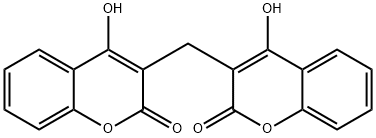
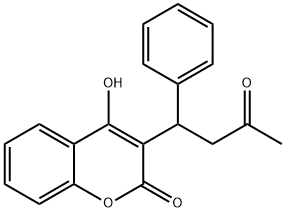
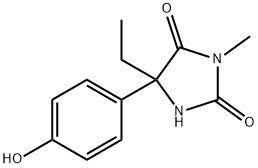

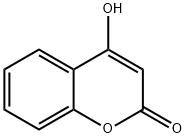
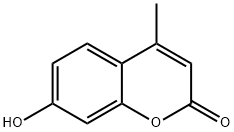
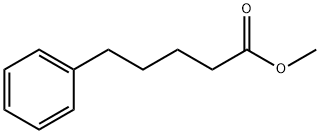
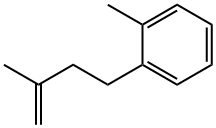
You may like
-
 Coumatetralyl CAS 5836-29-3View Details
Coumatetralyl CAS 5836-29-3View Details
5836-29-3 -
 1975-50-4 98%View Details
1975-50-4 98%View Details
1975-50-4 -
 2-HYDROXY BENZYL ALCOHOL 98%View Details
2-HYDROXY BENZYL ALCOHOL 98%View Details
90-01-7 -
 2-Chloro-1,3-Bis(Dimethylamino)Trimethinium Hexafluorophosphate 221615-75-4 98%View Details
2-Chloro-1,3-Bis(Dimethylamino)Trimethinium Hexafluorophosphate 221615-75-4 98%View Details
221615-75-4 -
 61397-56-6 CIS BROMO BENZOATE 98%View Details
61397-56-6 CIS BROMO BENZOATE 98%View Details
61397-56-6 -
 14714-50-2 (2-Hydroxyphenyl)acetonitrile 98+View Details
14714-50-2 (2-Hydroxyphenyl)acetonitrile 98+View Details
14714-50-2 -
 118753-70-1 98+View Details
118753-70-1 98+View Details
118753-70-1 -
 733039-20-8 5-broMo-2-chloro-N-cyclopentylpyriMidin-4-aMine 98+View Details
733039-20-8 5-broMo-2-chloro-N-cyclopentylpyriMidin-4-aMine 98+View Details
733039-20-8